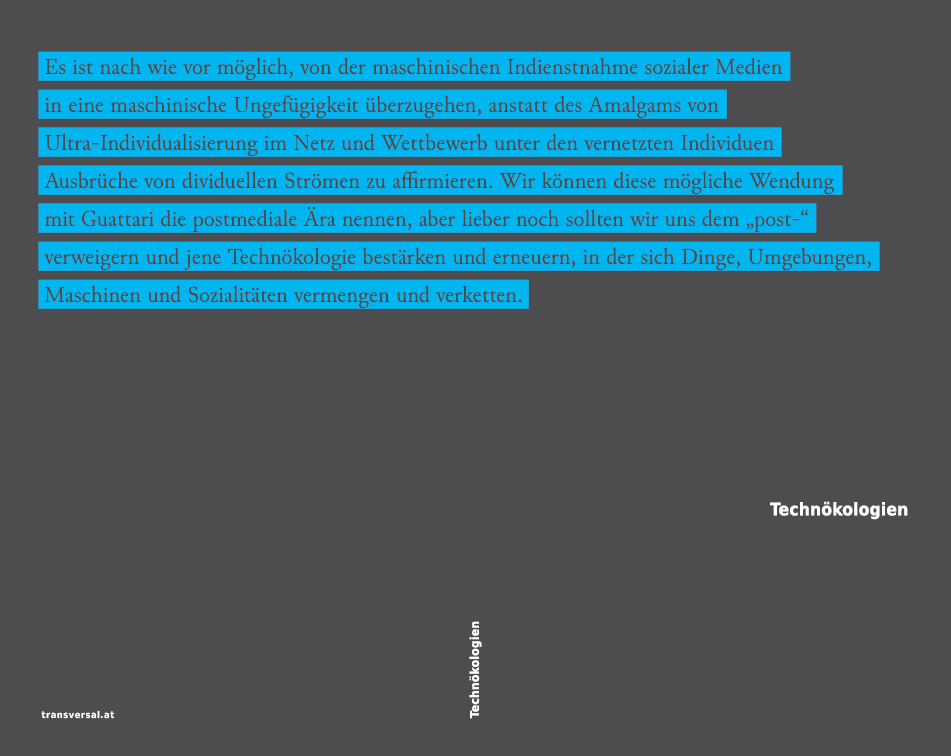Christoph Brunner, Raimund Minichbauer, Kelly Mulvaney, Gerald Raunig (eds.): Technökologien (2018) [German]
Filed under book | Tags: · ecology, environment, media, media archeology, social movements, technology, technopolitics

“Im dividuell-maschinischen Kapitalismus geht Technologie weit über die dichotomen Figuren von Techno-Euphorie (maschinischer Fortschritt in der Hand von Menschen) und Techno-Phobie (Menschen als Instrumente der Maschinen) hinaus. In so unterschiedlichen Feldern wie finanziellen Derivaten und Kryptowährungen, digitalen Schnitten und Data Doubles, biometrischen Filmbildern und sozialen Medien werden Technologien zu Umwelt, Umhüllung, Umgebung.
Mit dem Begriffsvorschlag Technökologien und Beispielen aus der Medienarchäologie der 1990er und 2000er Jahre, vor allem aber anhand der Untersuchung konkreter aktueller Praxen versucht das vorliegende Buch, diesen Verschiebungen gerecht zu werden: In der Mitte der technökologischen Subjektivierung, die nicht selten die Form von Wut, Angst, Hass und Häme annimmt, ergeben sich auch neue Weisen der Affizierung, neue Äußerungsweisen, neue Verhältnissetzungen von Technopolitik und sozialer Bewegung.
Mit Beiträgen von: Christoph Brunner, Marco Deseriis, Katrin M. Kämpf und Christina Rogers, Brigitta Kuster, Stamatia Portanova, Gerald Raunig, Álvaro Ruiz, Raúl Sánchez Cedillo.”
Publisher transversal texts, Vienna, August 2018
Copyleft
ISBN 9783903046214, 3903046213
157 pages
Langdon Winner: Autonomous Technology: Technics-out-of-Control as a Theme in Political Thought (1978)
Filed under book | Tags: · politics, technics, technocracy, technological society, technology, technopolitics

“The truth of the matter is that our deficiency does not lie in the want of well-verified ‘facts’. What we lack is our bearings. The contemporary experience of things technological has repeatedly confounded our vision, our expectations, and our capacity to make intelligent judgments. Categories, arguments, conclusions, and choices that would have been entirely obvious in earlier times are obvious no longer. Patterns of perceptive thinking that were entirely reliable in the past now lead us systematically astray. Many of our standard conceptions of technology reveal a disorientation that borders on dissociation from reality. And as long as we lack the ability to make our situation intelligible, all of the “data” in the world will make no difference.” (From the Introduction)
Publisher MIT Press, 1978
ISBN 0262730499, 9780262730495
396 pages
PDF (updated on 2012-7-15)
Comment (0)Gabrielle Hecht (ed.): Entangled Geographies: Empire and Technopolitics in the Global Cold War (2011)
Filed under book | Tags: · cold war, decolonization, eastern europe, geopolitics, politics, technology, technopolitics

“The Cold War was not simply a duel of superpowers. It took place not just in Washington and Moscow but also in the social and political arenas of geographically far-flung countries emerging from colonial rule. Moreover, Cold War tensions were manifest not only in global political disputes but also in struggles over technology. Technological systems and expertise offered a powerful way to shape countries politically, economically, socially, and culturally. Entangled Geographies explores how Cold War politics, imperialism, and postcolonial nation building became entangled in technologies and considers the legacies of those entanglements for today’s globalized world.
The essays address such topics as the islands and atolls taken over for military and technological purposes by the supposedly non-imperial United States, apartheid-era South Africa’s efforts to achieve international legitimacy as a nuclear nation, international technical assistance and Cold War politics, the Saudi irrigation system that spurred a Shi’i rebellion, and the momentary technopolitics of emergency as practiced by Medecins sans Frontières.
The contributors to Entangled Geographies offer insights from the anthropology and history of development, from diplomatic history, and from science and technology studies. The book represents a unique synthesis of these three disciplines, providing new perspectives on the global Cold War.”
Publisher MIT Press, 2011
Inside Technology series
ISBN 0262515784, 9780262515788
336 pages
PDF, PDF (updated on 2019-7-14)
Comment (0)
